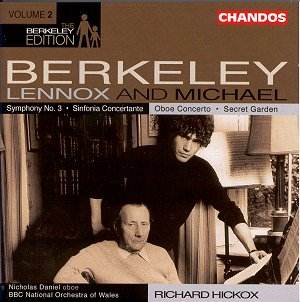Despite the gap of a generation, only four years separate
Lennox Berkeley’s Sinfonia Concertante from his eldest son’s
Concerto for Oboe and String Orchestra. The Sinfonia Concertante
also features a prominent part for solo oboe and both works were written
for Janet Craxton, a performer whose mantle has perhaps been handed
over to the fine soloist here, Nicholas Daniel. This however is where
the comparisons end for in the case of Berkeley senior his later works
were notable for their economy of expression and melodic astringency.
Michael on the other hand, at the time of his Oboe Concerto in
1977, was still trying to find his own voice, a challenge that must
have been daunting given the myriad of influences that he heard around
him through his father’s wide circle of composer friends. As a result
the early tonal, unashamedly melodic, even lush style demonstrated in
his Concerto, was later to be dispensed with in favour of a considerably
more adventurous approach, rather going against the grain for a younger
composer whose contemporaries were, in a number of cases, moving in
the opposite harmonic direction and abandoning atonality in a move towards
the "post-modernist" ethic.
Lennox Berkeley’s later economy is best demonstrated
here by the Symphony No. 3, a tautly constructed, even terse work in
one fourteen minute movement, albeit falling into three readily identifiable
sections and conveniently tracked as such on this disc. Berkeley makes
use of a somewhat diluted approach to twelve tone technique, much of
the material stemming from the opening motif which contains part of
the chromatic germ from which the rest of the symphony is to grow, giving
the work its characteristic sound-world. The result is impressively
argued and aurally coherent if veering slightly towards the cerebral,
a point that is emphasised and made all the more obvious by the stylistic
changes that his music had undergone by this point.
Interestingly the premiere of the Sinfonia Concertante
was given at the same Prom as the London premiere of the Third Symphony,
a concert that commemorated Berkeley’s seventieth birthday. What a great
pity it is that a number of other important British composers who have
celebrated similar milestones since were not afforded such an honour!
Although written four years later than the Symphony the Sinfonia
Concertante turns out to be the more expansively melodic of the
two works, no doubt due to the composer’s specific intentions in writing
for Janet Craxton and his desire to demonstrate the "oboe’s aptitude
for melodic expression and expansion" rather than as a "vehicle
for the display of virtuosity"; not that the work is lacking in
technical fireworks as the second movement Allegro vivace shows.
However, contrast this with the sunny fourth movement Canzonetta
and one can clearly see what the composer was wishing to achieve.
The work is beautifully and idiomatically written for the solo instrument
and Berkeley’s scoring for his scaled-down orchestra, coupled with a
touch of added colour from the piano is exquisitely done. Of the two
works it is the impressive concision and cohesion of the Symphony that
creates the more striking impression.
I clearly recall hearing Michael Berkeley’s early Symphony
in One Movement: Uprising, for the first time and being astonished
by its, at times, almost literal debt to Stravinsky, in particular the
Symphony in Three Movements. In point of fact the Symphony
appeared in 1980, three years after the Oboe Concerto, although
in the concerto it is the composers who surrounded Berkeley during his
youth, close friends of his father, that seem to exert the strongest
influence on the young composer. The year Berkeley began work on the
concerto saw the death of his godfather, Benjamin Britten, and as a
result the work became a memorial to his father’s great friend. Indeed,
the final movement carries the title, Elegy: In memoriam Benjamin
Britten, although echoes of Britten also seem to hover in the opening
movement. The central Scherzo: Allegro vivace is closer to his
father’s music and perhaps not a long way from the language of Kenneth
Leighton. Stylistic concerns aside however it is the young Berkeley’s
ability to carry a sustained melodic line that makes the concerto worthwhile.
Nicholas Daniel takes full advantage in a performance packed with atmosphere
and gloriously singing solo playing.
Secret Garden serves as a good example of what
Michael Berkeley’s music has become. It is not devoid of melody but
is set against a more adventurous backdrop of harmonic freedom creating
a harsher soundworld in which dissonance plays an integral, if controlled,
part. The piece takes the listener on a journey through the recesses
of the mind, following paths that are sometimes quickly aborted or can
lead to further discoveries. The orchestration is exciting, the overall
invention possibly less so, but the blazing closing paragraphs are undeniably
impressive and had me reaching for the remote for a repeat hearing.
Chandos’s recording is finely captured in the spacious
acoustics of Swansea’s excellent Brangwyn Hall. The strings in the Concerto
have both warmth, natural depth of tone and admirable rhythmic clarity
whilst the dynamics of the orchestra in full flight are truly thrilling
(try the aforementioned closing bars of Secret Garden). Ultimately
though it is Nicholas Daniel that steals the show. His playing demonstrates
a musicianship that ranks him amongst our very finest instrumentalists
and his contribution to this release cannot be underestimated.
Christopher Thomas
